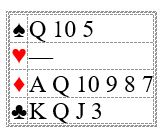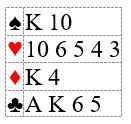Situation: You open the bidding one of a suit in 1st or 2nd seat, left hand opponent makes a suit overcall, partner passes, and right hand opponent passes. Notice that partner did not make a negative double. Do you keep the auction open and, if so, how?
Marty Bergen has guidance for us in this situation. I will summarize his guidance below, but first look at two hands I recently observed. For each of them would you bid, pass, or make a reopening double?
Hand 1:
Hand 2:
What did you decide?
Here is Marty’s guidance:
Doubling in this situation is not “automatic” as some players seem to think. The main consideration is your holding in opponent’s suit.
-
Void: It’s rarely the case that you should double. Defending with a trump void is usually not correct. I was surprised to read this guidance. But on reflection “law of total tricks” may work in opponents favor on average, so our side may get a better score on offense than by defending. What do you think?
-
Singleton: Usually the ideal time to double.
-
Doubleton: Good time to double an overcall at a low level.
-
Three cards: Try to avoid making a double.
-
Four or more: Never make a reopening double.
Post mortem on the two hands:
-
Hand 1: South made the reopening double, partner bid two hearts, and South ran to three diamonds resulting in plus 130 for above average board.
-
Hand 2: South chose to rebid three clubs holding 10 cards in the rounded suits. A reopenng double would have resulted in 1100 points for NS. North had the ideal “trap pass”, and the partnership missed the opportunity for a top board.




